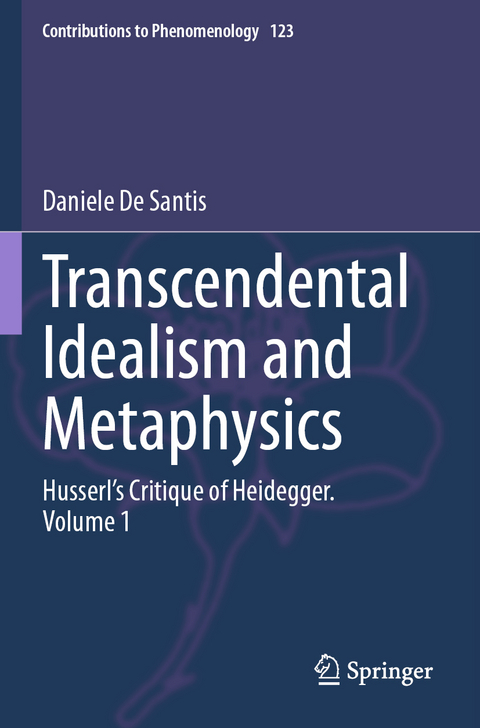
Transcendental Idealism and Metaphysics
Springer International Publishing (Verlag)
978-3-031-39588-8 (ISBN)
Winner of the Edward Goodwin Ballard Prize as announced at the Society for Phenomenology and Existential Philosophy Meeting on September 27, 2024
The book offers a systematic reconstruction of the disagreement between Husserl and Heidegger from the former's perspective, but without falling into any form of Husserlian apologetics. The main thesis is that Husserl's critique of Heidegger's existential analytics as a form of philosophical anthropology entails a deeper fundamental thesis, namely that Heidegger confuses the object of first philosophy (the transcendental determination of the subject) with metaphysics (in the Husserlian sense of the expression). Addressing the Husserl-Heidegger confrontation, this text provides the first systematic reconstruction of Husserl's conception of the system of philosophy from the perspective of his later works, with a special focus on the Cartesian Meditations. At stake in Husserl's critique of Heidegger's philosophy in Being and Time is the refusal to transcendentalize the irrational aspects and nature of our human existence. This first volume addresses Husserl's doctrine of transcendental idealism with the aim of elucidating the distinction between first philosophy, second philosophies and what Husserl calls last philosophy. This volume appeals to students and researchers.
Daniele De Santis (1983) is Assistant Professor in the Department of Philosophy and Religious Studies (ÚFAR) of Charles University, Prague. He works mainly on the history of early phenomenology (Husserl, Stein, Hering, Heidegger, Beck) and the history of philosophy (Plato, history of Platonism, Kant, Lotze). He is the editor in-chief of The New Yearbook for Phenomenology and Phenomenological Philosophy (Routledge); he has recently published the monograph Husserl and the A Priori. Phenomenology and Rationality (Springer 2022); and the collective volumes: The Routledge Handbook of Phenomenology and Phenomenological Philosophy (Routledge 2021) and Wilfrid Sellars and Phenomenology: Encounters, Intersections, Oppositions (Ohio University Press 2022).
Introduction (Introducing the Idea of Hegemony to Phenomenology).- PART I. The Transcendental Subject or, of First Philosophy.- Chapter 1: Confusion and Obscurity of the Subjects.- Chapter 2: Concreteness of the Subject: Dasein.- Chapter 3: Concreteness of the Subject: The Monad.- Chapter 4: Exemplary Entities: Formal Indication and Eidetic Variation.- Chapter 5: The Nomos of the Transcendental, CODA-Remarks on the Person in CM V.- Chapter 6: Primum Concretum and Transcendental Idealism.- Appendix: Of a Hegemonic Discourse about the History of Early Phenomenology: Outline of a Paradigm Revision.- Conclusion.
| Erscheinungsdatum | 22.10.2024 |
|---|---|
| Reihe/Serie | Contributions to Phenomenology |
| Zusatzinfo | XXVII, 268 p. 9 illus. |
| Verlagsort | Cham |
| Sprache | englisch |
| Maße | 155 x 235 mm |
| Themenwelt | Geisteswissenschaften ► Philosophie ► Geschichte der Philosophie |
| Geisteswissenschaften ► Philosophie ► Metaphysik / Ontologie | |
| Geisteswissenschaften ► Philosophie ► Philosophie der Neuzeit | |
| Geisteswissenschaften ► Religion / Theologie | |
| Schlagworte | first philosophy • Heidegger's Critique of Husserl • husserl and heidegger • husserl heidegger and reason • husserl heidegger metaphysics • husserl heidegger ontology • Idealism-Realism Controversy • Monadology and philosophy • Suffering and philosophy • Transcendental idealism • Transcendental philosophy |
| ISBN-10 | 3-031-39588-3 / 3031395883 |
| ISBN-13 | 978-3-031-39588-8 / 9783031395888 |
| Zustand | Neuware |
| Informationen gemäß Produktsicherheitsverordnung (GPSR) | |
| Haben Sie eine Frage zum Produkt? |
aus dem Bereich


